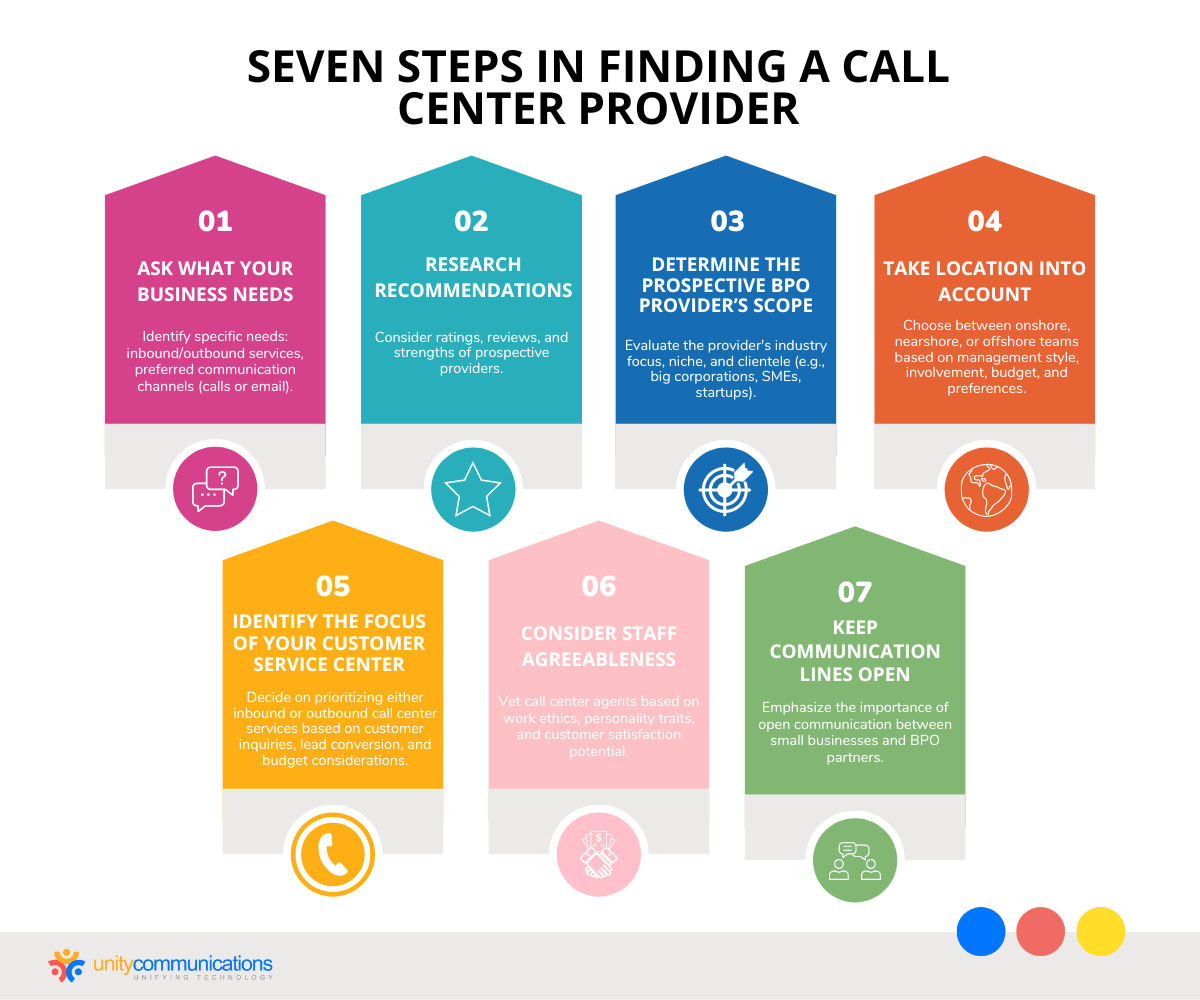IN THIS ARTICLE
Table of Contents
Many associate “call centers” with big businesses because they have the budget to build inbound and outbound teams. Call center services, however, are not always limited to large enterprises.
Business process outsourcing (BPO) has enabled small and midsize enterprises (SMEs) and startups to provide high-quality customer service. The strategy has achieved widespread adoption because it offers expanded benefits at more affordable costs.
This article explores how you can leverage call center outsourcing for your small business.
Seven Steps in Finding a Call Center BPO Provider for a Small Business

Given consumers’ changing expectations, outsourcing customer support is the best and most practical way to reap benefits. Word-of-mouth advertising is also one of your most effective marketing moves. So your BPO partner is critical in ensuring smooth transactions between your brand and the target audience.
Follow the steps below to find the right call center outsourcing provider for your small business.
1. Ask What Your Business Needs
Outsourcing provides flexible options so that you can customize your contracted services as necessary. That said, do not be afraid to be as specific as possible regarding your needs. Do you require both inbound and outbound services? Do you need only an inbound team because customers prefer ordering via phone calls? What channels will you use—calls or email?
Each company has different needs, and so does your small business. Your contact center provider is supposed to fill in what you lack, but first, you must identify your unique needs. Once you accomplish this first step, narrow your search by listing non-negotiable qualities you want in a service provider.
2. Research Recommendations
Unsure which outsourcing company to contact? Browse articles and blogs for information and recommendations on reliable and popular call center outsourcing providers for small businesses.
Look at the prospective provider’s rating and reviews. High ratings are proof of a provider’s dependability because many businesses can attest to its quality of work. Also, consider the vendor’s strengths to enrich your search. Nothing should hinder your growth when you partner with the right BPO partner.
3. Determine the Prospective BPO Provider’s Scope
This is a crucial step in building a team to help you with your contact center needs. Some customer service centers have particular industries, niches, and business types that they cater to. For example, some providers serve big corporations, while others focus on assisting SMEs or startups.
Before deciding to work with a vendor, request a quote. Assess and compare the provider’s service offerings and pricing against your needs, resources, and budget. Identify its engagement terms and determine whether they clash with your conditions. If areas of disagreement exist, find a middle ground that satisfies your demands and expectations.
3. Take Location Into Account
Location is crucial when looking for an outsourced call center provider. You can hire onshore, nearshore, or offshore teams.
Determining the right arrangement depends on your preferred management style. Do you want to be more involved in the third-party team’s operations, or are you concerned only about results? Are you willing to take on more responsibility? Do you have sufficient funds for an onshore team, or do you want a remote offshore team at a fraction of the cost?
If you choose an offshore center, remember that you and your BPO partner might have time zone differences. Consider the potential language and cultural barrier as well. The choices you make affect customer satisfaction rates and workflow.
For example, the Philippines is a great offshore call center outsourcing destination for small businesses. The country held the title “call center capital of the world” for years. Filipinos also have one of the highest EF English Proficiency Index scores, garnering 22nd place with a score of 578.
4. Identify the Focus of Your Customer Service Center
Finalize your call center outsourcing engagement by identifying the type of center—inbound or outbound—to use as the core of your operations. An inbound call center manages customer concerns and ensures they receive support upon contacting your business. Meanwhile, an outbound center is best for generating warm leads.
How do you determine which call center service to prioritize? Assess where you need a third-party call center team most. Do you receive numerous customer inquiries or convert leads better by sending emails and calling potential customers?
Concentrating on one call center aspect first is ideal since your business is still at the starting point. Having both types is not bad, but focusing on one and later building the other is better for your budget.
5. Consider Staff Agreeableness
An important trait to consider when vetting call center agents is how well you can work with them. Think again before collaborating with a third-party team with inconsistent work ethics and unpleasant characters. Rather than creating an organized flow, onboarding these individuals might only cause more problems for your business.
Be clear about what you want from your third-party agents. Thoroughly review their background and experience to land the best members for your team.
Lastly, consider whether your customers will enjoy interacting with your third-party agents. Customer satisfaction is the biggest determinant of your outsourcing engagement’s success.
6. Keep Communication Lines Open
One of our tips for outsourcing customer service is to keep communication lines open at all times. Call center outsourcing for a small business will only be successful if you are clear about your demands and expectations. Service providers must also be honest about their progress and struggles.
Ensuring you and your BPO partner can properly convey feedback and instructions helps improve your contact center’s output. Both parties should always be on the same page on crucial business matters, from guidelines for managing customer tickets to suggestions on refining outbound emails.
Creating a long-term relationship with your third-party call center team guarantees your company’s growth. It also helps you make a better plan for business expansion.
Costs of In-house Customer Service vs. Call Center Outsourcing for a Small Business

An in-house call center is costly for customer support and sales. For example, an average customer service agent in the U.S. makes $36,201 per year plus $1,801 in benefits. Multiply that figure by three or more, depending on how many seats you need on the team. You also likely need a call center manager who earns $50,060 annually with $14,445 in additional pay.
That is just the main labor cost of the team. Other expenses that might add up include phone systems, office supplies, commissions, fees, and other team members such as analysts, quality assurance specialists, and trainers.
In this example, the cost breakdown of an in-house call center team of three agents is as follows:
| Agents’ salaries and benefits | $114,006 |
| Customer service manager | $64,505 |
| Hiring expense | $12,000 |
| Office space | $10,000 |
| Hardware and software | $3,600 |
| Total | $204,111 |
In contrast, you no longer need to worry about miscellaneous expenses when outsourcing. You just have to pay a service charge. On average, the cost of call center outsourcing for a small business ranges from $6 to $20 per hour. According to Syrow, the average hourly rate of an outsourced call center by region is as follows:
| Location | Price per Hour |
| Western Europe | $40+ |
| The U.S./Canada | $25 – $35 |
| Australia | $33 – $35 |
| Eastern Europe | $12 – $25 |
| Africa | $15 – $20 |
| Latin America | $8 – $18 |
| East Asia | $8 – $14 |
| India | $6 –$10 |
The math shows that call center outsourcing is more affordable than in-house customer service for a small business. However, cost should not be the only factor guiding your decision. You also need to find a BPO partner that brings more value to the collaboration with innovation, training, expertise, data, insights, and unique solutions such as inventory management outsourcing.
Factors That Determine the Price of Outsourced Call Center Services

Different factors determine the final price of call center outsourcing for a small business. Generally, these are the primary elements you should consider:
- Call volume is the average number of calls you receive per week. Typically, call volume is lower for business-to-business (B2B) firms and higher for business-to-customer (B2C) companies.
- Average handling time is the length of each call on average.
- Number of seats pertains to the team size you plan to create.
- Agent expertise depends on the customer service levels you plan to offer. Level 1 is for basic questions, level 2 is for complex subject matter, and level 3 is for advanced problems.
- Length of the contract determines how long the agreement will last, either short-term or long-term.
- Labor market rate is the cost of labor in a particular location.
- Add-ons refer to any additional features you need, such as infrastructure, specialized training, or a business continuity program.
Another factor you should consider is the firm’s pricing model. The typical pricing scheme includes per hour of calls answered, fully managed, and co-managed.
Remember that pricing alone does not guarantee the call center’s service quality. Saving money is smart as long as you do not sacrifice quality. You must ask yourself, “What is business process outsourcing for me, and is it worth the price I will pay?”
Advantages of Call Center Outsourcing for a Small Business

Call center outsourcing has many pros and cons that you should consider when deciding whether to pursue the venture. Below is a list of advantages to help you make a decision:
- Omnichannel reach. Wherever your clients are is where you should be, especially regarding communication channels. Whatever your customers prefer—calls, live chat, email, or text messaging—find a call center that supports multiple channels. Do not limit your customer support to calls alone; empower agents to cater to users on all platforms.
- 24/7 customer service. Many customers expect round-the-clock customer service. However, it is costly for a small business to pay for the overnight shifts of employees. You can leverage time zone differences to cover 24 hours of the day without assigning additional shifts.
- Improved flexibility. Unlike full-time staff, third-party agents work for your business when necessary. You can easily and immediately assign agents to meet the demand, knowing you need not pay overtime or upcharge for changes. Third-party agents continue to receive payment based on time spent.
- Transfer call overflow. Small businesses might encounter higher call volume than usual, especially during holidays. Managing spikes in call center tickets during such times can be difficult. You can engage an outsourced call center whose primary role is to handle overflow to easily transfer tickets without stress.
- Organized agent management. Agent management is a breeze since you know who is managing what. Your partner also has established operations with supervisors and team leaders overseeing the agents assigned to you. They make sure agents follow company policies and offer commendable assistance.
- International expansion assistance. An outsourced call center is useful if your business is considering global expansion. It is best to place your call centers where you plan to expand your market. That way, you have a local center with agents who speak the same language and have the same culture.
- Real-time updates. The service provider gives instantaneous insights and analytics when calls are answered and after resolutions. Team leaders assess calls for quality assurance and compliance with policies.
- Noticeable results. Because the former is contractual, you are more likely to see results with an outsourced call center than an in-house department. Your chosen service provider must give desired results at the set time and ensure all tickets receive punctual responses.
Disadvantages of Call Center Outsourcing for a Small Business

You might encounter these drawbacks with call center outsourcing for a small business. Understanding these issues is crucial to mitigating potential risks.
- Communication barriers. When outsourcing email support and call center services to an offshore destination, prepare for potential language barriers. Another cause of concern is different accents or a lack of understanding of local slang that can hamper the resolution process or affect customer experience.
- Little product knowledge. Third-party agents have little understanding of your business and products. Although they receive training before deployment, they might know only the basics and cannot resolve complex issues.
- Reduced staff collaboration. Teams often work closely together, especially if they are physically together in one location. However, external call center agents do not have the same collaboration and might not work in the same office. Thus, collaboration decreases, leading to a slower spread of information across the department.
- Less control over who gets hired. When you transfer control to a third party, your BPO partner hires whomever it sees fit. It might not ask for your approval. You might find that some recruited agents do not fit the role.
- Less emphasis on customer satisfaction. Since your call center team is detached from your in-house departments, they might not have the same commitment to excellent customer service. That is not to say external agents do not care about assisting customers—in-house staff might simply want to strengthen customer loyalty more.
- Local unemployment. When transferring jobs overseas, one might worry about the lack of vacancies for domestic workers. When you outsource data entry services, for instance, you take local opportunities to remote staff. Although this is not necessarily good or bad, it raises customer concerns about the value of onshore labor.
Now that you know the pros and cons of outsourced call center services, you might wonder whether they increase your profit.
Does Call Center Outsourcing Increase Profit?
Yes, call center outsourcing increases the profit of a small business. It is a go-to solution for many companies because it boosts revenue. Here are a few points:
- Outsourcing costs are lower than domestic wages, especially in offshore destinations that offer the same services.
- Outsourcing also saves on limited resources—time, effort, money, and equipment.
- You can leverage outbound solutions, generate interest from your target market, or sell your products or services.
- A reputable call center provider improves customer care, engagement, acquisition, and retention performances.
Is Call Center Outsourcing a Good Idea?

Absolutely! Many small businesses and even Fortune 500 companies use call center outsourcing. Generally, outsourcing depends on your current business needs. Before finding a call center provider, you should understand your internal concerns and capacities.
If you have completed this and are ready for the next step, here are some indicators that call center outsourcing is a good idea for your small business:
- Productivity issues. Your business is growing, and keeping up with administrative tasks is challenging. You and your staff are losing focus on your core competencies. You find it difficult to meet deadlines.
- Budget problems. You need to reduce operating costs to make room for other business investments and projects. You might lack the funds to manage an in-house team. The economy might be bad at the moment, making it hard to find and retain talent.
- A lack of specialized skills. You find it difficult to hire talent with the necessary skills. You require someone with specialized skills in handling different types of customers. You are targeting another location whose market speaks a different language.
The Bottom Line
If you own a small business and plan to outsource call center services, defining your needs and problems is crucial. Identify the business aspects that you need help with. Sit down with key decision-makers in your business to discuss the current challenges and situations.
Once you determine your requirements, find a call center outsourcing vendor who will benefit your small business in the long run. Note that outsourcing has pros and cons. You can fully reap the benefits only if you partner with a reputable service provider in your industry.
Unity Communications is here for you, so look no further for the best call center outsourcing provider. Ready to take your business to the next level? Call us, and let’s connect!





